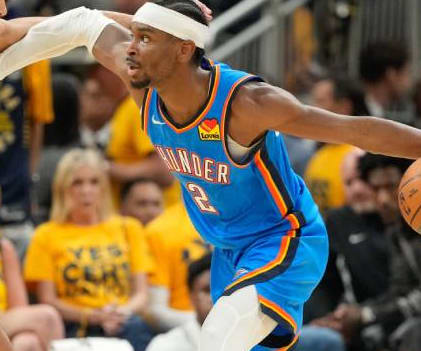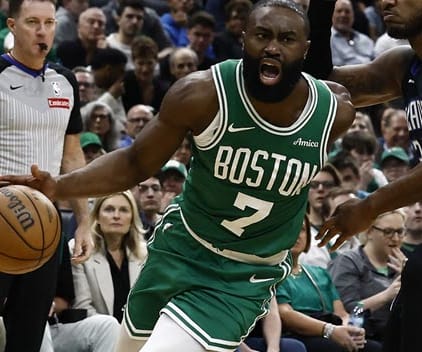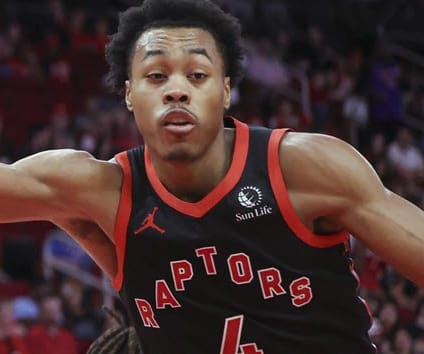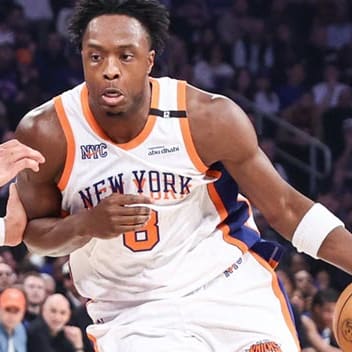2025 Stats
PTS
18.6
REB
3.6
AST
2.4
STL
0.7
BLK
0.7
ROS Projections
2025 Fantasy Outlook
Grant hasn't made more than 63 regular-season appearances since 2019-20, when he was in Denver. He played a career-high 35.7 minutes per game in 2022-23, his first season in Portland, but his playing time has dropped in each campaign since. Grant attempted to expand his range in 2024-25, aiming for a career-high 6.3 three-pointers per game, but this effort significantly impacted his overall field goal percentage, as he finished with a career-low 37.3 percent mark. Grant hasn't come off the bench since 20219-20, but times are changing in Portland. Anfernee Simons was traded away, but Toumani Camara, Shaedon Sharpe and Deni Avdija all still have strong cases to start over Grant, while offseason addition Jrue Holiday and third-year guard Scoot Henderson will carve out usage, regardless of their role. However, Grant has three years left, including a player option for 2027-28, and will be making at least $30 million each season, so the Trail Blazers will finally be incentivized to play him, even if he isn't their best chance at winning games. Grant's days of flirting with top-100 upside are likely behind him, but he's still a safe selection after pick 150 in deeper category leagues and should be taken before pick 200 in points leagues. Read Past Outlooks

Starting nod Sunday
Grant is in the starting lineup for Sunday's game against the Cavaliers.
ANALYSIS
Grant will step into the starting lineup Sunday with Jrue Holiday (personal) and Deni Avdija (back) sidelined, marking his first start since Dec. 18 and 15th overall this season. In 14 previous starts, the veteran forward has produced 21.9 points, 5.1 rebounds and 2.9 assists in 33.3 minutes per contest.
Grant will step into the starting lineup Sunday with Jrue Holiday (personal) and Deni Avdija (back) sidelined, marking his first start since Dec. 18 and 15th overall this season. In 14 previous starts, the veteran forward has produced 21.9 points, 5.1 rebounds and 2.9 assists in 33.3 minutes per contest.
NBA Per Game Stats
Per Game
Total
Per 36
NBA Per Game Stats
Loading Per Game Stats...
2025 NBA Game Log
2025
2024
2023
2022
2021
2020
2019
2018
2017
2016
2025 NBA Per Game Split Stats
Schedule
By Month
Starting/Off Bench
Days Rest
Vs Opp
By Result
2025 NBA Per Game Split Stats
Loading Split Stats...
Advanced Stats
Loading Advanced Stats...
Stat Review
2025
2024
2023
2022
2021
2020
2019
2018
2017
2016
How does Jerami Grant compare to other players?
This section compares his stats with all players from the previous three seasons (minimum 200 minutes played)*. The bar represents the player's percentile rank. For example, if the bar is halfway across, then the player falls into the 50th percentile for that stat and it would be considered average.
True Shooting %
59.1%
Effective Field Goal %
51.3%
3-Point Attempt Rate
46.0%
Free Throw Rate
49.7%
Offensive Rebound %
3.5%
Defensive Rebound %
9.9%
Total Rebound %
6.6%
Assist %
12.8%
Steal %
1.0%
Block %
2.1%
Turnover %
10.3%
Usage %
25.0%
Fantasy Points Per Game
28.4
Fantasy Points Per Minute
1.0
NBA Historical Fantasy Stats
Historical ADP
Loading Historical ADP...
Trail Blazers Depth Chart
Our full team depth charts are reserved for RotoWire subscribers.
Subscribe Now
Trail Blazers Rotation: Minutes Breakdown
Loading Trail Blazers Rotation Data...
Average Fantasy Points
Minutes
FanDuel
DraftKings
Yahoo
FantasyDraft
Head2Head
Sorare
Average Fantasy Points are determined when Jerami Grant was active vs. non-active during the season. Click here to view average fantasy points for a different time period.
Loading Average Minutes...
Past Fantasy Outlooks
2024
2023
2022
2021
2020
2019
2018
2017
2016
2015
2014
A staple of tanking teams, Grant hasn't played a basketball game in April in the past three years and has emerged victorious in just 56 of those past 165 appearances. Despite playing in just 54 games last year, he led the Trail Blazers in total points (1,132), averaging 21.0 per game on 45/40/82 shooting. He also added 3.5 rebounds and 2.8 assists in his 33.9 minutes. Once again, he projects to be a roughly 20-point scorer on one of the worst teams in the league. At 30 years old and with a contract through the 2027-28 season, the Blazers will presumably attempt to trade Grant sooner than later, but finding a suitor might be close to impossible. Portland is constructing an intriguing young core with Anfernee Simons, Scoot Henderson, Shaedon Sharpe, Deni Avdija and Donovan Clingan (maybe Deandre Ayton qualifies). Does it make sense to keep feeding Grant the ball? He's in a bit of a fantasy basketball no man's land - only selected late in drafts out of obligation, not because anyone actually wants to roster him. He's fine to price enforce after pick 100, but it's probably not necessary to draft him sooner. Even if he manages to return top-75 value when he's on the court, will he play in April, let alone mid-March?
More Fantasy News

Totals 19 points in loss
Grant had 19 points (4-9 FG, 1-3 3Pt, 10-15 FT), two rebounds, three assists, two blocks and one steal in 27 minutes during Monday's 102-94 loss to Boston.
ANALYSIS
Subscribe now to instantly reveal our take on this news.
Subscribe now to instantly reveal our take on this news.

Modest performance Friday
Grant notched eight points (2-8 FG, 0-5 3Pt, 4-6 FT), two rebounds, two assists, one block and one steal over 26 minutes during Friday's 110-98 loss to the Raptors.
ANALYSIS
Subscribe now to instantly reveal our take on this news.
Subscribe now to instantly reveal our take on this news.

Omitted from injury report
Grant (Achilles) is off the injury report for Friday's game against Toronto.
ANALYSIS
Subscribe now to instantly reveal our take on this news.
Subscribe now to instantly reveal our take on this news.

Will play Thursday
Grant (Achilles) is good to go for Thursday's game against the Heat, Danny Marang of 1080 The Fan Portland reports.
ANALYSIS
Subscribe now to instantly reveal our take on this news.
Subscribe now to instantly reveal our take on this news.

Upgraded to probable Thursday
Grant (Achilles) has been upgraded from questionable to probable for Thursday's game against the Heat.
ANALYSIS
Subscribe now to instantly reveal our take on this news.
Subscribe now to instantly reveal our take on this news.
Latest Fantasy Rumors

Portland could take calls
Portland is actively shopping Grant ahead of the trade deadline as it looks to create future cap flexibility, Evan Sidery of Forbes.com reports.
ANALYSIS
Grant is earning $32 million this season and remains under contract through the 2027-28 campaign, making his deal a significant long-term commitment. Sidery notes that the Trail Blazers may need to attach draft capital to move Grant's contract, limiting their leverage in negotiations.
Grant is earning $32 million this season and remains under contract through the 2027-28 campaign, making his deal a significant long-term commitment. Sidery notes that the Trail Blazers may need to attach draft capital to move Grant's contract, limiting their leverage in negotiations.














